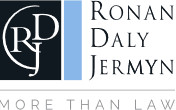Padraic Brennan: High Court confirms requirement for expert report in professional negligence proceedings

Padraic Brennan
Ronan Daly Jermyn partner Padraic Brennan and trainee solicitor Thomas McInerney review a recent High Court decision on professional negligence.
A recent decision of the High Court serves as a reminder of the continuing relevance of the Supreme Court decision in Cooke v Cronin [1999] IESC 54, and the fact that the courts have little time for allegations of professional negligence which are unsubstantiated by expert evidence.
Facts
The application before the High Court concerned an attempt to recover costs arising from probate proceedings in which the plaintiff solicitors had acted for the defendants. In their defence, a counterclaim was made that legal services provided by the plaintiff failed to meet a professional standard.
The defendant sought to have the plaintiff’s claim struck out and also sought an Order for damages, costs and outlay, on the basis of allegations of professional negligence, which were not supported by expert evidence.
Finding
Meenan J referred to the well-established rule set out in the Supreme Court decision of Cooke v Cronin which states that the commencement of a professional negligence action, without first ascertaining that reasonable grounds to do so exist, amounts to an abuse of the process of the court. The High Court in Loomes held that this rule applied equally to the present facts where a (counter) claim alleging professional negligence against the plaintiff was made by the defendant seeking to defend an action brought by a professional.
As a reminder of the basis for this rule, Cooke v Cronin involved a medical negligence action in which the plaintiff’s expert evidence was provided by the solicitor’s General Practitioner, who had met the plaintiff only once. In the Supreme Court, Denham J held that in the absence of expert evidence establishing reasonable grounds for such a claim, professional negligence claims are an abuse of process. Keane J noted that a ‘serious responsibility’ rests on the legal profession in instituting proceedings against professional persons, as well as in their conduct throughout the process.
Applying Cooke v Cronin, the High Court held in Loomes that the defendant’s failure to provide any expert evidence to support her claim of professional negligence was detrimental to her (counter) claim.
Comment
This recent High Court judgment provides a welcome reminder that there need be no malicious intent for a court to deem a claim of professional negligence to be an abuse of process in the absence of expert evidence critical of the professional.
The absence of expert evidence can be sufficient grounds for a court to find that the plaintiff or defendant has not established reasonable grounds for bringing such a claim or counterclaim alleging professional negligence.

- Padraic Brennan is a partner and Thomas McInerney is a solicitor at Ronan Daly Jermyn.











